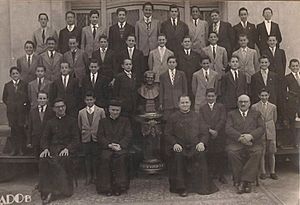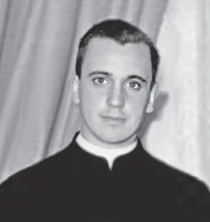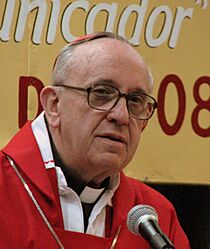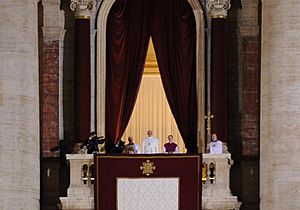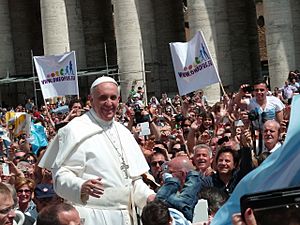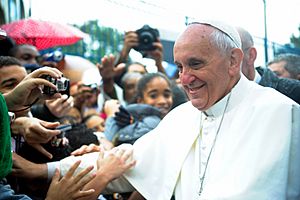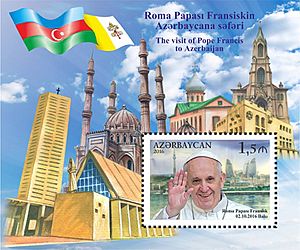Pope Francis facts for kids
Quick facts for kids Pope Francis |
|
|---|---|
| Bishop of Rome | |
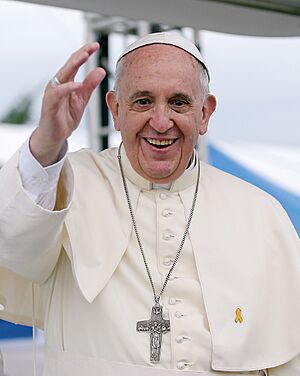
Francis in 2014
|
|
| Church | Catholic Church |
| Papacy began | 13 March 2013 |
| Papacy ended | 21 April 2025 |
| Predecessor | Benedict XVI |
| Successor | Leo XIV |
| Orders | |
| Ordination | 13 December 1969 |
| Consecration | 27 June 1992 by Antonio Quarracino |
| Created Cardinal | 21 February 2001 |
| Rank | Cardinal priest |
| Personal details | |
| Birth name | Jorge Mario Bergoglio |
| Born | 17 December 1936 Buenos Aires, Argentina |
| Died | 21 April 2025 (aged 88) Domus Sanctae Marthae, Vatican City |
| Buried | Santa Maria Maggiore, Rome, Italy |
| Previous post | |
| Education |
|
| Motto | Miserando atque eligendo (Latin for 'By having mercy and by choosing') |
| Signature | |
| Coat of arms |  |
Pope Francis (born Jorge Mario Bergoglio; 17 December 1936 – 21 April 2025) was the head of the Catholic Church and leader of Vatican City from March 2013 until his death in April 2025. He was a pope of many firsts. He was the first pope from the Jesuits, a religious order known for its focus on education and missionary work. He was also the first pope from the Americas and the first from the Southern Hemisphere.
Born in Buenos Aires, Argentina, to Italian immigrant parents, Bergoglio worked as a chemical technician and a nightclub bouncer before beginning his religious studies. He was ordained a Catholic priest in 1969. He later became the Archbishop of Buenos Aires in 1998 and was made a cardinal in 2001 by Pope John Paul II. After Pope Benedict XVI resigned in 2013, the papal conclave elected Bergoglio as the new pope. He chose the name Francis in honor of Saint Francis of Assisi, who was known for his simple life and care for the poor.
As pope, Francis was known for his humility and simple lifestyle. He chose to live in a guesthouse instead of the grand papal apartments in the Apostolic Palace. He often spoke about the importance of God's mercy, helping the poor, and protecting the environment. He encouraged dialogue with other religions and worked to build bridges between nations. For example, he helped restore diplomatic relations between Cuba and the United States.
Francis was also known for his efforts to reform the Church. He worked to make the Vatican's finances more open and addressed difficult issues within the clergy. He taught that the Church should be a welcoming place for all people. His papacy is remembered for its focus on compassion, social justice, and care for the planet.
Early Life
Pope Francis was born Jorge Mario Bergoglio on December 17, 1936, in Flores, a neighborhood of Buenos Aires, Argentina. He was the oldest of five children. His parents, Mario José Bergoglio and Regina María Sívori, were of Italian heritage. His father's family had moved to Argentina in 1929.
As a boy, Bergoglio attended a school run by the Salesians of Don Bosco. He later studied at a technical school and earned a diploma as a chemical technician. For a few years, he worked in the food section of a laboratory. As a young man, he also worked as a janitor and a bouncer at a bar.
When he was 21, he suffered from a serious case of pneumonia. Because of the illness, he had to have a part of one of his lungs removed. This did not stop him from pursuing his goals.
Path to the Priesthood
Bergoglio was inspired to become a priest after going to confession on Spring Day, a student holiday in Argentina. In 1958, he joined the Society of Jesus, also known as the Jesuits. He studied humanities in Chile and philosophy in Argentina.
After his studies, he taught literature and psychology at a high school in Santa Fe and later in Buenos Aires. In 1967, he began studying theology and was ordained as a priest on December 13, 1969.
He continued to serve in the Jesuit order and held several leadership positions. In 1992, he was appointed as an auxiliary bishop of Buenos Aires. This meant he was a helper to the main archbishop. He chose the motto Miserando atque eligendo, which means "by having mercy and by choosing." This phrase comes from a story about how Jesus chose one of his apostles.
Archbishop of Buenos Aires
On February 28, 1998, Bergoglio became the Archbishop of Buenos Aires. As archbishop, he was known for his simple and humble lifestyle. He lived in a small apartment instead of the large bishop's residence. He often used public transportation and cooked his own meals.
One of his main goals was to increase the Church's presence in the poor neighborhoods, or villas miserias, of Buenos Aires. He sent more priests to work in these areas and visited them often himself. This earned him the nickname "the slum bishop."
In 2001, Pope John Paul II made him a cardinal. Even as a cardinal, he remained committed to social justice and helping those in need.
During a difficult time in Argentina's history known as the Dirty War (1970s), when the country was under military rule, some people questioned Bergoglio's actions. However, many others, including a Nobel Peace Prize winner, said he never helped the military government. They stated that he worked secretly to protect people and help them escape danger.
Becoming Pope Francis
Election and Name
After Pope Benedict XVI resigned in February 2013, cardinals from all over the world gathered in Rome for a papal conclave to elect a new pope. On March 13, 2013, on the second day of the conclave, Jorge Mario Bergoglio was elected.
He chose the papal name Francis in honor of Saint Francis of Assisi. He explained that during the election, a fellow cardinal from Brazil hugged him and said, "Don't forget the poor." This made him think of St. Francis, who was known for his life of poverty and his love for the poor and for nature. It was the first time a pope had ever chosen the name Francis.
A Different Style of Papacy
From the very beginning, Pope Francis showed a less formal style than his predecessors. On the night of his election, he rode a bus back to the hotel with the other cardinals instead of using the special papal car. He also chose to live in the Domus Sanctae Marthae, a Vatican guesthouse, rather than the large papal apartments.
He was known for his simple clothing, wearing a plain white cassock and the same iron pectoral cross he had worn as a cardinal, instead of a gold one. These choices showed his commitment to a simpler, more humble Church.
Key Teachings and Actions
Caring for the Poor and the Planet
A central theme of Francis's papacy was caring for the poor and marginalized. He often spoke out against economic systems that he felt harmed the poor and created inequality. He encouraged people and governments to build a fairer society.
Francis was also deeply concerned about the environment. In 2015, he wrote an important letter called Laudato si' ("Praise Be to You"). In it, he called on all people to take action on climate change and to protect the Earth, which he called "our common home." He said that caring for nature and caring for the poor were connected.
Building Bridges
Pope Francis worked hard to promote peace and understanding between different groups. He encouraged ecumenism, which is the effort to bring different Christian churches closer together. He also focused on interreligious dialogue, meeting with leaders from many faiths, including Muslims, Jews, and Buddhists.
In 2019, he signed a historic document with the Grand Imam of Al-Azhar, a leading figure in Sunni Islam. The document, called the Document on Human Fraternity, called for peace and tolerance among all people.
Reforming the Church
One of Pope Francis's major tasks was to reform the Roman Curia, which is the central administration of the Catholic Church. He appointed a group of cardinals to advise him on making the Vatican's government more efficient and responsive.
He also took steps to make the Vatican's finances more transparent and accountable. He appointed more women to leadership roles within the Vatican. He also promoted a "synodal" church, which means a church that listens more to all its members, including laypeople, in making decisions.
A Global Leader
International Diplomacy
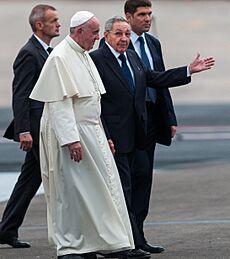
Pope Francis played an important role on the world stage. He was a key figure in helping to restore diplomatic relations between the United States and Cuba in 2014. He acted as a trusted mediator between the two countries.
He often called for peace in conflict zones around the world. He spoke out against the war in Ukraine and the conflict between Israel and the Palestinians, urging leaders to find peaceful solutions. He also drew attention to the struggles of migrants and refugees, calling on countries to welcome and protect them.
Apology to Indigenous Peoples
In July 2022, Pope Francis traveled to Canada to apologize for the Catholic Church's role in the country's residential school system. For many years, Indigenous children were taken from their families and forced to attend these schools, where many suffered abuse.
During his visit, Francis expressed his "deep shame and sorrow." He said, "I humbly beg forgiveness for the evil committed by so many Christians against the Indigenous peoples." This apology was a significant moment for many survivors and their families.
Later Years and Legacy
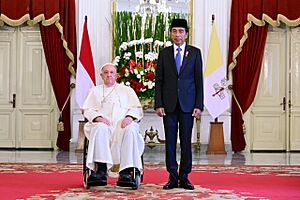
In his later years, Pope Francis faced several health challenges. He had problems with his knee and sciatica, a nerve condition, which often required him to use a wheelchair or a cane. Despite these issues, he continued to travel and lead the Church actively.
Francis's last public appearance was on Easter Sunday, April 20, 2025. He died the next day, on April 21, 2025, at his residence in the Vatican. He was 88 years old. In his will, he asked to be buried in the Basilica of Santa Maria Maggiore in Rome, a church he loved.
Pope Francis is remembered as a transformative figure who brought a new spirit of openness and compassion to the papacy. His legacy includes his strong focus on the poor, his passionate defense of the environment, and his efforts to build a more inclusive and merciful Church.
See also
 In Spanish: Francisco (papa) para niños
In Spanish: Francisco (papa) para niños
- List of current Christian leaders
- List of current heads of state and government
- List of popes
 | Toni Morrison |
 | Barack Obama |
 | Martin Luther King Jr. |
 | Ralph Bunche |


